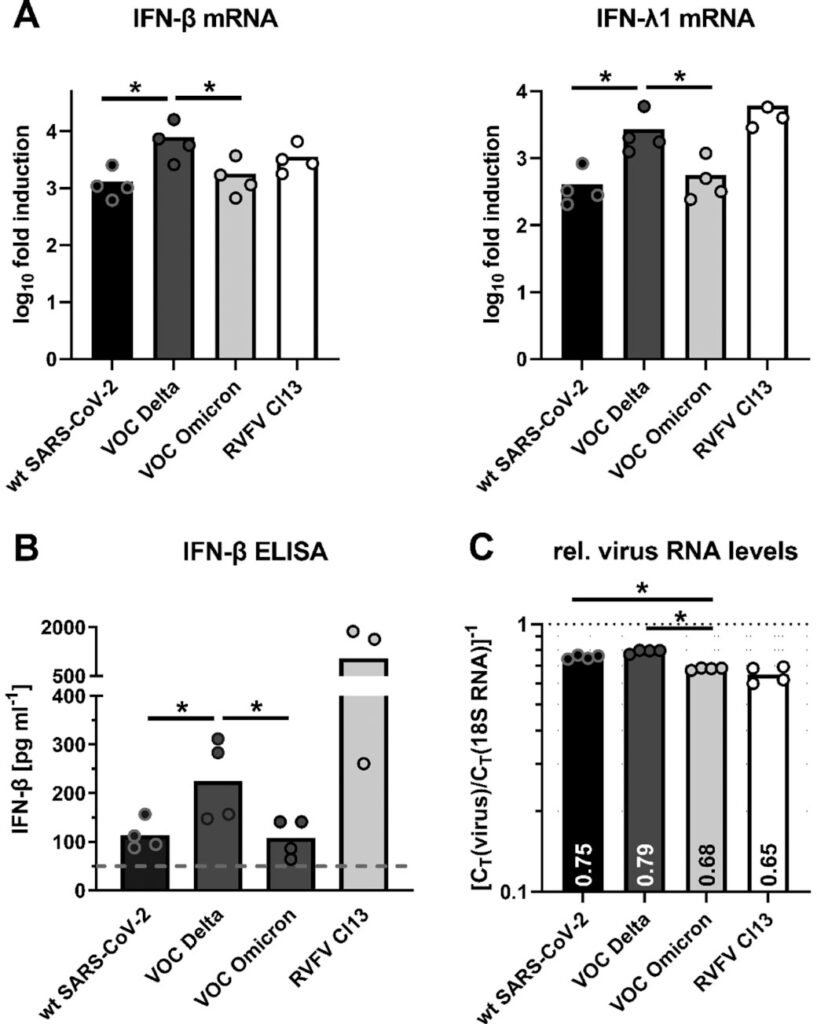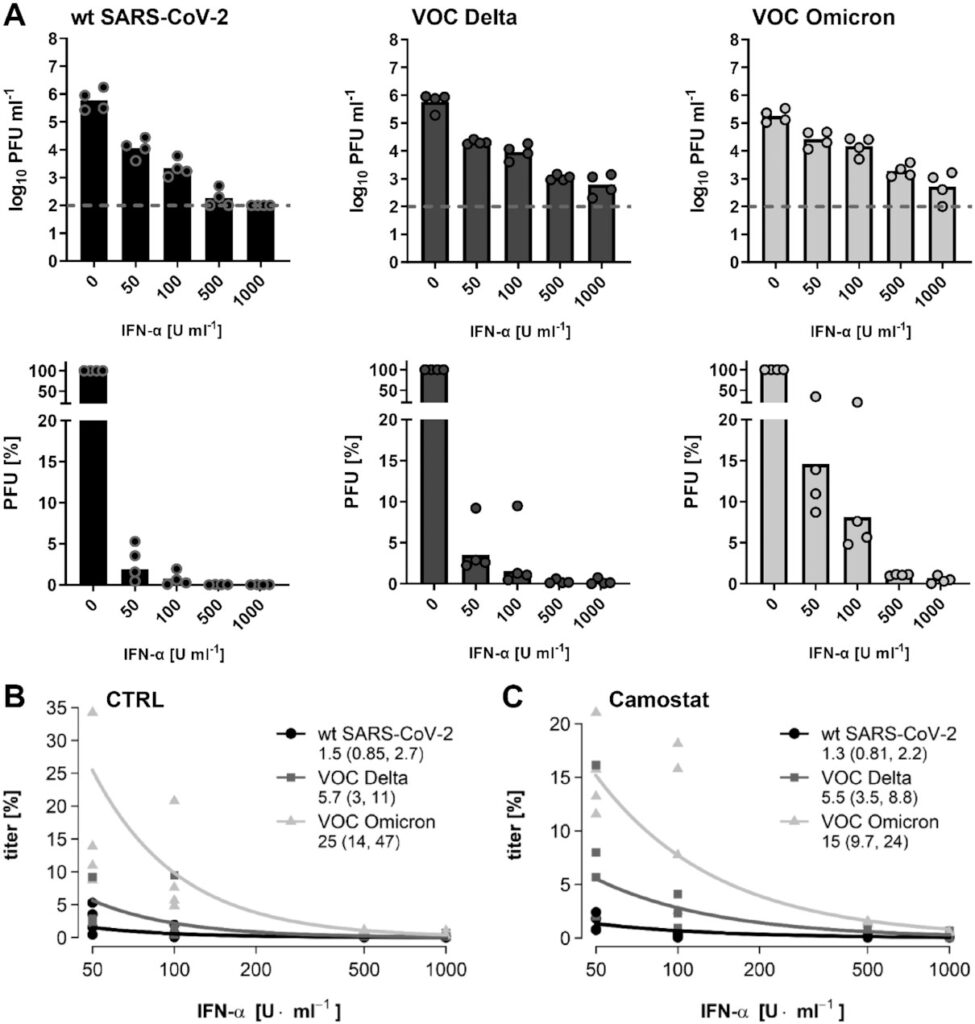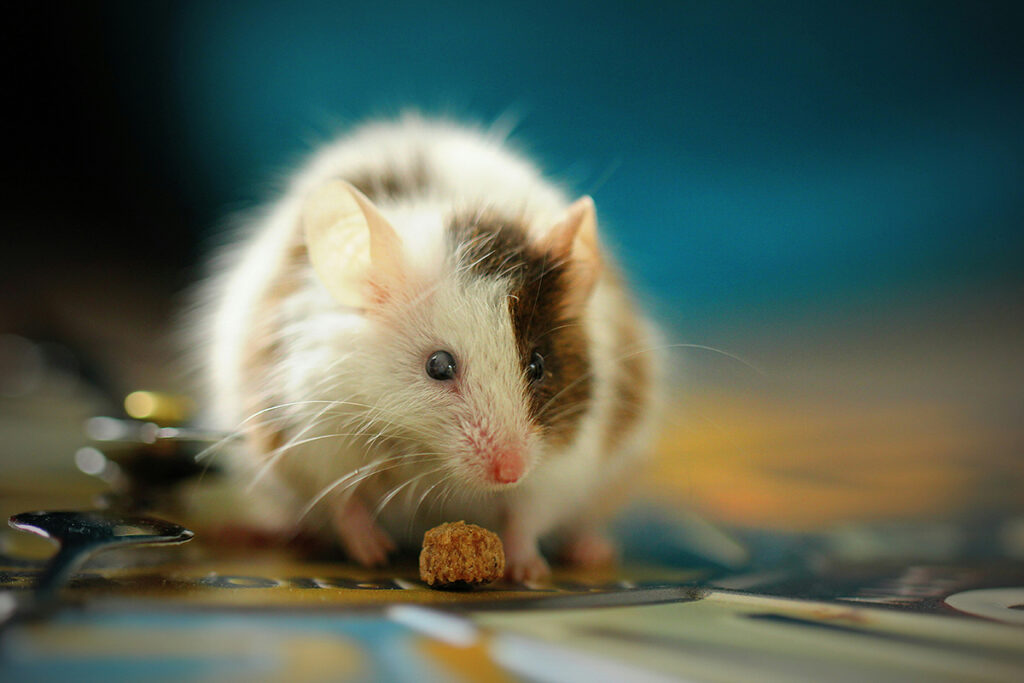Omicron is the most contagious of all coronavirus strains and the most resistant to immunity developed in response to a vaccine or natural infection. The reason for these features of Omicron is the numerous mutations that distinguish Omicron from the original coronavirus strain that appeared at the end of 2019 and the later Delta strain.
Type I interferons (IFN-alpha/beta) mediate the innate immune system’s response to viruses. Pattern recognition receptors on the surface of cells detect the presence of viral RNA and trigger interferon production. In response to interferon, many cells express interferon-stimulated genes (ISGs) that have antiviral properties.
Coronavirus has learned to bypass the antiviral response of interferon. However, in response to the entry of SARS-CoV-2, body cells still produce type I interferon and other signaling molecules, and the introduction of interferon suppresses virus replication.
German scientists investigated how Omicron interacts with the interferon system compared to the original coronavirus strain (WT) and the Delta strain. The researchers used the IFN-responsive Rift Valley Fever Virus (RVFV) as a positive control. The study was carried out on a cellular model of human lungs.
Interferons Production is Low in Omicron
Scientists infected cells with three coronavirus strains and measured the levels of IFN-beta and IFN-lambda-1 (type III interferon).
All strains of coronavirus triggered an interferon response. The cells produced the most interferon when infected with the Delta strain. However, the interferon response was reduced when infected with the original strain and Omicron.
Image source: https://academic.oup.com/pnasnexus/article/1/2/pgac067/6590844
Omicron is More Sensitive to The Antiviral Action of Exogenous Interferon
The scientists treated the cells with increasing IFN-alpha and then infected them with three coronavirus strains. Virus titers were measured after 24 hours.
IFN suppressed all viruses in a dose-dependent manner. IFN at a dosage of 50 U/ml suppressed Omicron by 15%, but the original strain and Delta by less than 10%.
Image source: https://academic.oup.com/pnasnexus/article/1/2/pgac067/6590844
The mode of entry of the virus does not affect sensitivity to interferon
SARS-CoV-2 can enter cells either through the plasma membrane using TMPRSS2 or through membrane vesicles called endosomes. Unlike previous strains, Omicron uses endosomes – this is an easier way to enter the cell. For more information on how coronavirus enters cells, see the article “Why Omicron is A Milder But More Contagious Disease.”
To find out if the mode of entry of the virus affects IFN sensitivity, the scientists blocked access across the plasma membrane with the TMPRSS2 inhibitor Camostat. The method of penetration of the virus into the cell did not affect the sensitivity to interferon.
Interferon Suppression Does Not Affect Omicron
All strains of coronavirus, including Omicron, triggered the IFN response. To find out how interferon affects viral replication, the scientists disabled the IFN system with the Janus kinase inhibitor ruxolitinib. Blocking the interferon system increased the titers of the original coronavirus strain and the Delta strain but did not affect the titers of Omicron.
Image source: https://academic.oup.com/pnasnexus/article/1/2/pgac067/6590844
Conclusions
Numerous studies have shown that interferon suppresses the original strain of SARS-CoV-2 in cell culture, and in patients, early interferon therapy is associated with reduced mortality.
Whether a person gets sick with COVID-19 and the disease’s outcome depends on the timing and volume of interferon production. For example, the interferon system in children is pre-activated and controls infection better. However, in the elderly, the interferon system is less active and can be blocked by autoantibodies to interferon, which predisposes the elderly to more severe disease.
In addition, the risk of developing COVID-19 depends on viral resistance to the interferon response. Compared to the original coronavirus strain and the Delta strain, Omicron is the most resistant to the interferon response, making it easier to transmit the virus.
Pre-treatment of cells with interferon-alpha suppressed Omicron by 15%. In another study, intranasal interferon-lambda protected mice from the Omicron challenge. Nasal interferon may stimulate the mucosal immune response and prevent the development of COVID-19.
Useful article, necessary information? Share it!
Someone will also find it useful and necessary:






